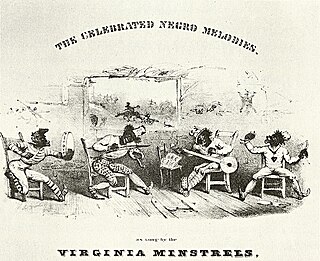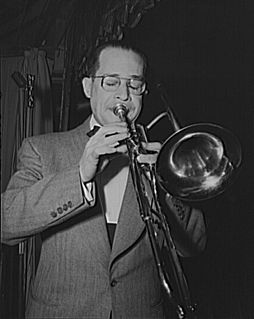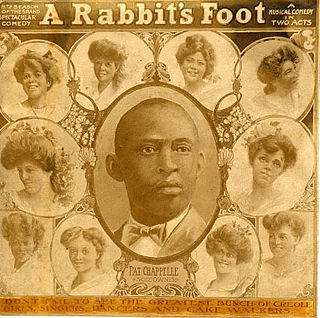Amos White (November 6, 1889 – July 2, 1980) was an American jazz trumpeter.
Jazz is a music genre that originated in the African-American communities of New Orleans, United States, in the late 19th and early 20th centuries, and developed from roots in blues and ragtime. Jazz is seen by many as "America's classical music". Since the 1920s Jazz Age, jazz has become recognized as a major form of musical expression. It then emerged in the form of independent traditional and popular musical styles, all linked by the common bonds of African-American and European-American musical parentage with a performance orientation. Jazz is characterized by swing and blue notes, call and response vocals, polyrhythms and improvisation. Jazz has roots in West African cultural and musical expression, and in African-American music traditions including blues and ragtime, as well as European military band music. Intellectuals around the world have hailed jazz as "one of America's original art forms".
White grew up an orphan in Charleston, South Carolina, where he played in the Jenkins Orphanage band in his teens in addition to traveling with minstrel shows and traveling circuses. After attending Benedict College, he returned to the orphanage to take a teaching position. During World War I White played in the 816th Pioneer Infantry Band in France, and settled in New Orleans after the war. Working as a typesetter, he played jazz in his spare time, working with Papa Celestin and Fate Marable among others. In the 1920s, he appeared on many records by blues singers such as Bessie Smith and Lizzie Miles, and played in the Alabamians. In 1928, he became the leader of the Georgia Minstrels.
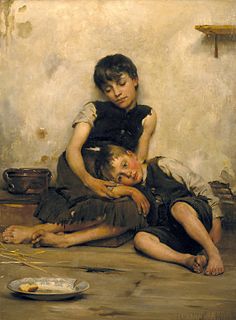
An orphan is someone whose parents have died, are unknown, or have permanently abandoned them.

Charleston is the oldest and largest city in the U.S. state of South Carolina, the county seat of Charleston County, and the principal city in the Charleston–North Charleston–Summerville Metropolitan Statistical Area. The city lies just south of the geographical midpoint of South Carolina's coastline and is located on Charleston Harbor, an inlet of the Atlantic Ocean formed by the confluence of the Ashley, Cooper, and Wando rivers. Charleston had an estimated population of 134,875 in 2017. The estimated population of the Charleston metropolitan area, comprising Berkeley, Charleston, and Dorchester counties, was 761,155 residents in 2016, the third-largest in the state and the 78th-largest metropolitan statistical area in the United States.

The Jenkins Orphanage was established in 1891 by Rev. Daniel Joseph Jenkins in Charleston, South Carolina. Jenkins was a businessman and Baptist minister who encountered street children and decided to organize an orphanage for young African Americans.
In the 1930s, White moved to Phoenix, Arizona, where he played with his own group and with local dance groups, including Felipe Lopez's. Later in the decade he relocated to Oakland, California, where he played locally into the 1960s in marching bands.

Phoenix is the capital and most populous city of Arizona, with 1,626,078 people. It is also the fifth most populous city in the United States, and the most populous American state capital, and the only state capital with a population of more than one million residents.

Oakland is the largest city and the county seat of Alameda County, California, United States. A major West Coast port city, Oakland is the largest city in the East Bay region of the San Francisco Bay Area, the third largest city overall in the San Francisco Bay Area, the eighth most populated city in California, and the 45th largest city in the United States. With a population of 425,195 as of 2017, it serves as a trade center for the San Francisco Bay Area; its Port of Oakland is the busiest port in the San Francisco Bay, the entirety of Northern California, and the fifth busiest in the United States of America. An act to incorporate the city was passed on May 4, 1852, and incorporation was later approved on March 25, 1854, which officially made Oakland a city. Oakland is a charter city.
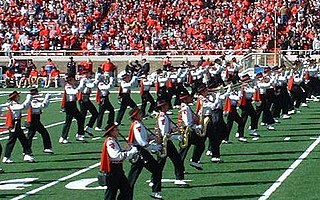
A marching band is a group in which instrumental musicians perform while marching, often for entertainment or competition. Instrumentation typically includes brass, woodwind, and percussion instruments. Most marching bands wear a uniform, often of a military style, that includes an associated organization's colors, name or symbol. Most high school marching bands, and some college marching bands, are accompanied by a color guard, a group of performers who add a visual interpretation to the music through the use of props, most often flags, rifles, and sabres.


